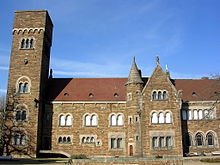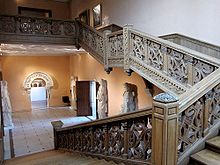- Musée Dobrée
-
The Musée Dobrée is a museum in Nantes, in the quartier Graslin in the immediate outskirts of the city centre and very close to the city's Natural History Museum. It was given to the city by Thomas Dobrée (13 August 1810-1895) and now belongs to the Conseil général de la Loire-Atlantique. In January 2010, the Conseil général began a project to restructure and modernise the museum, which is planned for completion in 2015.[1]
Contents
The Palais Dobrée
From an old Huguenot family which had originated in Normandy before moving to Guernsey in the 16th century, whose other members became businessmen and arms-bearers in Nantes, Thomas Dobrée found himself with a large fortune at a young age. He then abandoned business aged 28 to collect artworks for 64 years of his life. From 1862, he devoted himself to building his 'palais', to house the over 10,000 objets d'art which he had spent his life collecting. His collections were particularly rich in precious books such as incunables and old Breton printed books, along with miniature paintings on manuscripts, autographs, coins, medals and the other graphic arts (notably German and Dutch engravings). His collection also included important holdings of sculpture, paintings and decorative art objects from the Middle Ages to the end of the 19th century.
Built in the immediate outskirts of the 15th century manor of John V, Duke of Brittany, the palais Dobrée was in the Romanesque Revival style dear to Viollet-le-Duc, although it was a joint work by the architects Simon, Boismen, Chenantais and Le Diberder, who were constantly troubled by their patron regarding it. Its form was inspired by the designs on the Saint Calminius Reliquary, which was part of the collection. In total Dobrée spent 100,000 francs (254,000 Euros) a year over 34 years, though he never lived there and it was only completed after his death.
By a deed witnessed by a notary on 8 August 1894, Thomas Dobrée left the palais and his collections to the Département de Loire-Inférieure - the bequest planned that the Départemenat would be able to transfer its archaeological museum into the manoir de la Touche, but stipulated that Dobrée's collections had to be kept separate from the archaeological collections, as is still the case. The conseil général accepted the bequest and decided to name the museum the Musée Thomas Dobrée. In 1896 the archaeological collections were moved in and in 1899 the museum opened its doors to the public. In 1974 an extension was built and a modern building constructed in a corner of the palais' garden - it was there that the old archaeological museum's collections (notably the Egyptian antiquities) were displayed, with the palais itself given over entirely to Dobrée's collection.
Neighbouring buildings
Egyptian
Gallery
Bibliography
- Thomas Dobrée, 1810-1895. Un homme, un musée (collective catalogue) ; Nantes, Musée Dobrée et P., Somogy, 1997, 328pp
External links
- (French) Le musée Dobrée on www.loire-atlantique.fr
References
Categories:- Museums in Nantes
- Archaeological museums in France
- Art museums and galleries in France
- Romanesque Revival architecture
- Egyptological collections in France
Wikimedia Foundation. 2010.








